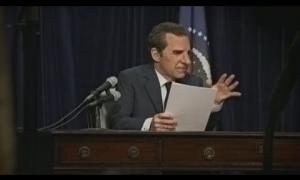In China, a rhetorical revolution?
January 16, 2019
Traditionally stilted and stuffy, Chinese speeches are gradually becoming more compelling, evocative—and even personal.
For years we've been hearing how the Chinese are stealing intellectual property from the West.
It's starting to show up in their speeches.
After about a decade of trying and failing to find discernible meaning in Chinese speeches (for publication in Vital Speeches International), I can report that they are becoming less ceremonial, coded, symbolic and platitudinous than they always were—and more communicative, evocative and persuasive.
Chinese presidents and premiers used to remind me of a government tour guide I had there 15 years ago, who spoke strictly in starchy idioms: He discouraged us from attending a local theater performance in Lijiang, which he compared to “a wet blanket on a long-suffering yak." He compared a worrier in our group to “an ant on a hot stove." He referred to his wife as “my better half,” his 93-year-old grandmother as “no spring chicken,” the local police as “stuffed shirts." He called the disastrous and deadly summer flooding in China as “par for the course” and hotel prices “highway robbery” (because “you pay through the nose”). When he bid us farewell in the evening, he advised us to, "Sleep tight. Do not let bed bugs bite!"
I would later come to understand that, whereas in the West, the overuse of clichés and colloquialisms was discouraged—in China, using familiar idioms was a way for a writer, or a speaker, to show linguistic mastery.
This year, China president Xi Jinping opened his New Year's speech in the traditional Chinese style—with a quote, unattributed: "Time stops for no one, and seasons keep changing."
He went on to utter many bromides:
"China, as a country of people on the move, is energetically pursuing prosperity. We are running at full speed towards the realization of our dreams."
"And now, looking forward, despite the complexities and difficulties we may face on the road ahead, we shall always closely rely on the people and stick to self-reliance and hard work."
"Our country has braved thorny paths and confronted stormy weather over the past seventy years."
"2019 will see both opportunities and challenges that will require us to work together shoulder to shoulder."
So far: par for the course!
But there are unmistakable signs, in the speech, of rhetorical Westernization.
For instance, the imagery in this passage would never have been seen in a Chinese speech even five years ago:
During my inspection tours around the country, I was pleased to see the lush green banks of the Yangtze River, the ocean of rice sprouting at the Jiansanjiang agricultural base, the lively Shenzhen Qianhai Harbor, the bustling Shanghai Zhangjiang High-tech Park, and the bridge that brings together Hong Kong, Zhuhai, and Macao. These achievements are all thanks to the hard work of people from all of China’s ethnic groups, who are the trail-blazers of the new era.
There was even—and this truly is a cultural revolution in China—some rudimentary personal storytelling:
My heart goes out to the people living in hardship. In Sanhe Village of Liangshan in Sichuan Province, I visited the families of two villagers from the Yi people. In Sanjianxi Village in Jinan City in Shandong Province, I sat down with the family of Zhao Shunli to hear about their day-to-day lives. In the Donghuayuan community in the city of Fushun in Liaoning Province, I visited Chen Yufang’s family to learn about how they were settling in after being relocated from a dangerous area. In Lianzhang Village in Qingyuan in Guangdong Province, I discussed with a villager named Lu Yihe how we could help to relieve his household’s poverty. I can vividly recall their down-to-earth sincerity. I would like to wish all of them and their fellow villagers a prosperous and thriving New Year.
(Did Xi really visit those poor people in their villages? In the Chinese media environment, does it matter?)
And then the very next day, Xi gave another speech, using much stronger language to signal that the country would take back control over a sovereign Taiwan, insisting a "one country, two systems" scheme, saying, “Different systems are not an obstacle to unification, and even less are they an excuse for separatism,” and adding, “We make no promise to abandon the use of force, and retain the option of taking all necessary measures."
Now that's the kind of rhetoric Americans are used to hearing.
For decades, the Chinese have been building their economic might. For years they've been building their military. Now that their rhetoric seems to be catching up, even a Western speechwriter might be forgiven for feeling like an ant on a hot stove.



